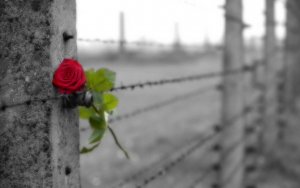The Function of Pain After a Loss

Life is made up of losses. Whenever we gain something, we always have to give something in return, like time, for example. There are losses that relieve us, those that we’re indifferent towards, and those that we wish we didn’t have to face. It could be a person that we’ve lost, but it could also be an object, a possibility, or a dream. When it comes to this last type of loss, it’s necessary to feel pain, especially when it cuts a deep wound into your skin.
Pain can be understood as a manifestation of sadness, which can lead other people to approach us and give us a little warmth that might somehow make up for the coldness that has taken hold in the newly created empty space. It’s meant to be received with empathy, few words, and a lot of understanding.

Pain doesn’t always arouse empathy in others
Unfortunately, pain can complicate life in a lot of ways. First of all, you might not receive that social support. Most of us understand that people suffer when they lose a loved one, since it’s an experience that we all unfortunately go through sooner or later. However, some people can’t understand suffering over other types of loss. For example, many people have never owned or loved a pet, and they don’t understand the pain that results from losing one.
Other losses that can be difficult to understand are opportunities or dreams. They’re important to you individually, and you often work towards them by yourself, so they hold a lot of hope for you that’s difficult to express because you can’t equate it with anything else. You can tell someone that you feel sad because all the work you’ve been doing for years has just faded away, but it’s going to be very hard for them to understand if they haven’t put in that effort with you or seen your face on the hard days. It’s hard to explain all that.
Therefore, the first problem that pain presents is a lack of validation from other people.

The three functions of pain
The first function of pain is to recognize that a loss has occurred. In fact, denial is sort of the opposite of pain. It’s living as if that person, dream, hope, object, or animal were still in your life. People who deny loss are resisting the onset of pain.
When denial occurs in the first few moments after the loss, it’s an adaptive strategy because it delays the impact of the loss while the brain can start to process the information, even though it’s not consciously. However, it’s not so adaptive when the denial is long-lasting, because the person can’t process the pain.
The second function of pain is to recognize that the thing that’s been lost, that was so important, existed. Pain serves to cleanse the memory of what was lost in a way. In this sense, denial can give rise to guilt, because while the person is trying to protect themselves, they feel like they’re betraying the memory of what they lost by not acknowledging their emotions and acting accordingly, or acknowledging the significance of what they lost. They then accumulate more negative feelings, and even sometimes resentment and contempt towards themselves.
Pain functions as a sort of acknowledgement and tribute.
Finally, pain allows for the story to be completed. It gives you space to write the last few sentences and then start a new chapter. It also attracts other people’s attention in many cases, even if you don’t talk about it. This promotes empathy, active listening, and company. This can balance out the possible sense of abandonment with the comfort that others provide.
In that way, pain is an intimate act of acknowledgement and love for the person who has gone. It’s a card written in the air that provides closure and holds gratitude for the time you shared with them, signed with the simple words “I will always miss you.”
Life is made up of losses. Whenever we gain something, we always have to give something in return, like time, for example. There are losses that relieve us, those that we’re indifferent towards, and those that we wish we didn’t have to face. It could be a person that we’ve lost, but it could also be an object, a possibility, or a dream. When it comes to this last type of loss, it’s necessary to feel pain, especially when it cuts a deep wound into your skin.
Pain can be understood as a manifestation of sadness, which can lead other people to approach us and give us a little warmth that might somehow make up for the coldness that has taken hold in the newly created empty space. It’s meant to be received with empathy, few words, and a lot of understanding.

Pain doesn’t always arouse empathy in others
Unfortunately, pain can complicate life in a lot of ways. First of all, you might not receive that social support. Most of us understand that people suffer when they lose a loved one, since it’s an experience that we all unfortunately go through sooner or later. However, some people can’t understand suffering over other types of loss. For example, many people have never owned or loved a pet, and they don’t understand the pain that results from losing one.
Other losses that can be difficult to understand are opportunities or dreams. They’re important to you individually, and you often work towards them by yourself, so they hold a lot of hope for you that’s difficult to express because you can’t equate it with anything else. You can tell someone that you feel sad because all the work you’ve been doing for years has just faded away, but it’s going to be very hard for them to understand if they haven’t put in that effort with you or seen your face on the hard days. It’s hard to explain all that.
Therefore, the first problem that pain presents is a lack of validation from other people.

The three functions of pain
The first function of pain is to recognize that a loss has occurred. In fact, denial is sort of the opposite of pain. It’s living as if that person, dream, hope, object, or animal were still in your life. People who deny loss are resisting the onset of pain.
When denial occurs in the first few moments after the loss, it’s an adaptive strategy because it delays the impact of the loss while the brain can start to process the information, even though it’s not consciously. However, it’s not so adaptive when the denial is long-lasting, because the person can’t process the pain.
The second function of pain is to recognize that the thing that’s been lost, that was so important, existed. Pain serves to cleanse the memory of what was lost in a way. In this sense, denial can give rise to guilt, because while the person is trying to protect themselves, they feel like they’re betraying the memory of what they lost by not acknowledging their emotions and acting accordingly, or acknowledging the significance of what they lost. They then accumulate more negative feelings, and even sometimes resentment and contempt towards themselves.
Pain functions as a sort of acknowledgement and tribute.
Finally, pain allows for the story to be completed. It gives you space to write the last few sentences and then start a new chapter. It also attracts other people’s attention in many cases, even if you don’t talk about it. This promotes empathy, active listening, and company. This can balance out the possible sense of abandonment with the comfort that others provide.
In that way, pain is an intimate act of acknowledgement and love for the person who has gone. It’s a card written in the air that provides closure and holds gratitude for the time you shared with them, signed with the simple words “I will always miss you.”
This text is provided for informational purposes only and does not replace consultation with a professional. If in doubt, consult your specialist.







